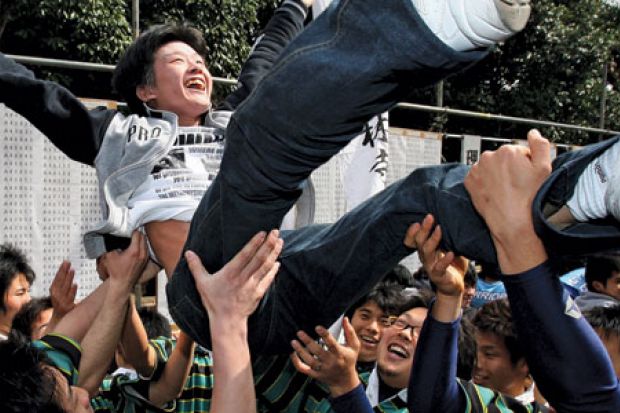“The 21st century will be the Asian century,” write Tan Eng Chye, deputy president (academic affairs) at the National University of Singapore, and Kishore Mahbubani, dean of its Lee Kuan Yew School of Public Policy, in the opening chapter of a new book, Asia: The Next Higher Education Superpower? This is a truly 21st-century question: not since the rise of India’s University of Nalanda in the 5th century AD or the great Chinese imperial examinations during the early years of the Tang dynasty – and certainly at no point in modern history – has it been possible to pose it in all seriousness.
So what’s the answer? And why does the question have such a compelling ring to it?
The notion of Asia – a perilously broad concept – as “superpower” reflects important historical developments. The first is increasing national interdependence, which leads countries to reflect on their place in the world; the second is the rise of many Asian economies, with the expectation that this will increase the region’s military, technical and cultural might.
Whether Asia is the next superpower (in whatever context) seems important to two audiences in particular: those in Asia itself and those in the West. This is not to say that the question has no relevance for others, only that it matters most to those who now hold superpower status and those who seem best able to challenge the status quo.
One of the ways that countries measure their status is through the quantity and quality of their knowledge production. It is widely accepted that a bellum omnium contra omnes rages in the knowledge sphere: international university rankings are used to gauge the winners and losers in this “war”.
Universities have become national champions here: not having institutions that can compete with the world’s best is taken to constitute a threat to a nation’s ability to compete, even survive, in the new landscape. This, in part, explains the massive investment in Asian education systems. It is no wonder then that university rankings mean so much, especially to aspiring nation-economies: the list of countries with official aspirations to have top 100 universities is long and growing.
On the part of the incumbents, rankings are also a matter of great interest. One of the most thoughtful reflections on the subject comes from Fazal Rizvi, professor of global studies in education at the University of Melbourne, who notes the post-colonial overtones of the Western-Asian divide. The latter’s rise is an important and well-rehearsed narrative for the former: whereas once it was manifest only in fear of the “yellow peril” and the threat of the East, now the picture is increasingly complex, with a growing sense of opportunity about attracting Asian students, even research funding.
Western ambivalence towards Asia remains. There are many critiques of Asian rote learning and the lack of critical thinking it encourages, but also growing admiration for Asian higher education’s increased research outputs, teaching resources, greater technical innovations and so on.
“The other is not only derided but also desired,” Rizvi argues.
International university rankings continue to draw attention to this dynamic: it is not possible to appear in them without taking up positions relative to others. The rankings often note how many universities from each country have made the top 200. It is difficult for policymakers to ignore the comparisons, flattering or otherwise.
Rankings frame the central question of superpower status and provide the answer. For many audiences – including governments, students and especially the public – they offer a clear narrative of haves and have-nots. They reflect Asian universities’ rising prestige but also show the gap that still yawns between them and “superpower” status.
The rankings also confirm the US’ place as the current number one: only when Asian institutions occupy the majority of places in the global top 20 will the question of a new superpower be “definitively” answered. Even with their impressive gains, that moment still seems far away, despite the optimism of Mahbubani, Tan and others.
Miguel Lim
EU-Marie Curie doctoral fellow, Aarhus University, Denmark
Register to continue
Why register?
- Registration is free and only takes a moment
- Once registered, you can read 3 articles a month
- Sign up for our newsletter
Subscribe
Or subscribe for unlimited access to:
- Unlimited access to news, views, insights & reviews
- Digital editions
- Digital access to THE’s university and college rankings analysis
Already registered or a current subscriber?
